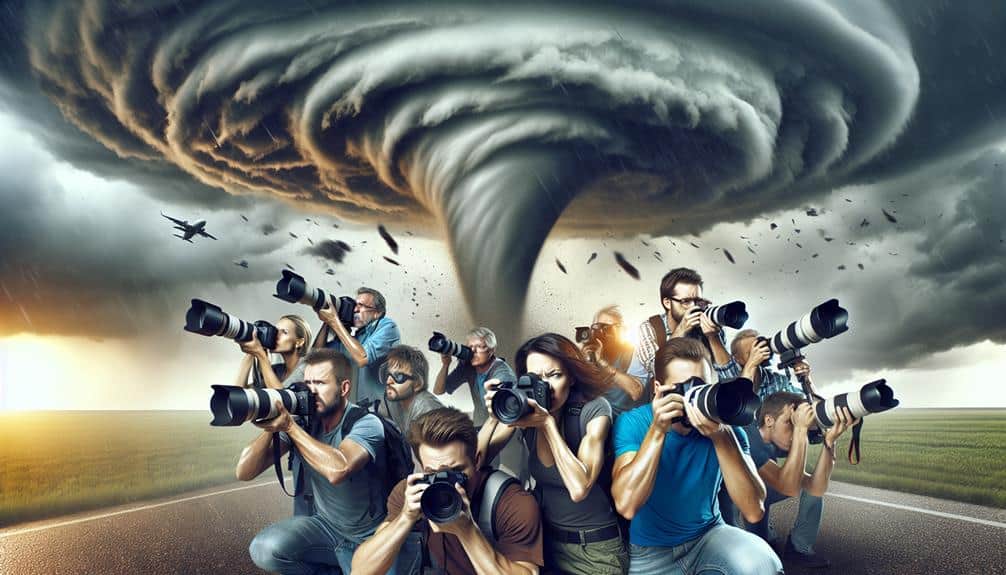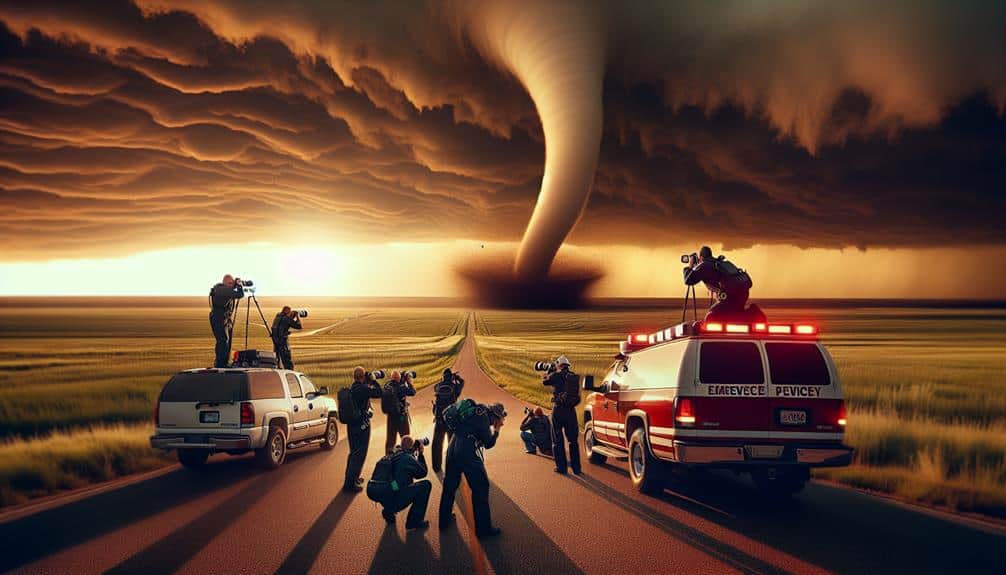Maintaining our mental health is crucial for storm chasers, given the high-stress nature of our work. Prioritizing self-care through relaxation techniques, and setting boundaries on energy use helps manage stress. Building a supportive network with peers keeps us grounded and validated. Regular mindfulness practices boost our emotional resilience, while consistent routines, including exercise and proper rest, enhance stability. Engaging in hobbies provides an emotional outlet, and seeking professional help offers tailored strategies. Staying active and reconnecting with nature can also uplift our spirits. By taking these steps, we're better equipped to handle the rigors of storm chasing and thrive in our passion.
Key Points
- Practice mindfulness through meditation and deep breathing to manage stress and anxiety effectively.
- Establish a support network with fellow storm chasers for emotional backing and camaraderie.
- Set and achieve realistic goals to maintain motivation and avoid burnout.
- Engage in regular physical activity to boost mood and enhance mental resilience.
Prioritize Self-Care
Let's remember that prioritizing self-care is important for maintaining our mental health while engaging in the high-stress activity of storm chasing. When we're constantly on the move, facing unpredictable weather, our stress levels can soar. To manage this, we need to incorporate self-reflection into our routines.
Taking a few minutes each day to assess our emotional state helps us identify when we're overwhelmed and need a break.
Relaxation techniques are another key aspect. Practices like deep breathing exercises, meditation, or even listening to calming music can greatly reduce stress. Evidence shows that these techniques can lower heart rates and promote a sense of calm, which is essential when we're in high-pressure situations.
Effective stress management also involves establishing boundaries. It's important to set clear limits on how much time and energy we dedicate to storm chasing. By setting these boundaries, we make sure that we've enough time for rest and personal activities, which are important for our mental well-being.
Build a Support Network
As storm chasers, we often face unique challenges that only our peers truly understand, so connecting with them can provide essential emotional support. Joining online communities and attending support groups can help us share experiences and coping strategies.
Evidence shows that a strong support network can greatly enhance our mental health and resilience.
Connect With Peers
Building a strong support network with fellow storm chasers can greatly improve our mental health by providing a sense of camaraderie and mutual understanding. Peer interactions serve as an essential coping strategy, allowing us to share experiences, validate our feelings, and reduce the sense of isolation that can accompany our unique lifestyle. When we connect with peers who truly understand the highs and lows of storm chasing, we foster an environment where we can openly discuss our challenges and triumphs.
Studies consistently show that robust support systems are essential for maintaining mental health. By actively engaging with other storm chasers, we create a network of individuals who can offer advice, share coping strategies, and provide emotional support during difficult times. This collective wisdom helps us navigate the psychological demands of our passion, ensuring we remain resilient and grounded.
Moreover, building these connections often leads to lasting friendships, which can be a source of joy and stability. When it's clear we're not alone in facing the stresses and hazards of storm chasing, we're more likely to maintain a positive outlook and continue pursuing our passion with renewed vigor and confidence.
Let's make a conscious effort to reach out and connect with our peers.
Join Online Communities
In addition to nurturing in-person connections, joining online communities can further expand our support network and provide continuous opportunities for engagement and learning. Online platforms like forums, social media groups, and specialized websites offer an invaluable space to share field experiences and receive real-time weather updates. These communities create a sense of belonging and understanding that can be challenging to find elsewhere, especially given the unique nature of storm chasing.
Through online interactions, we can exchange knowledge about meteorological phenomena, safety protocols, and technological advancements. Engaging with others who share our passion helps us feel less isolated and more connected to a broader network. Evidence suggests that having a strong support system greatly contributes to mental well-being, especially in high-stress professions like storm chasing.
Furthermore, online communities often provide timely weather updates, which are essential for planning our chases and ensuring our safety. We can discuss recent field experiences, share photos and videos, and receive constructive feedback. By participating in these communities, we not only gain practical insights but also emotional support, which is vital for maintaining our mental health.
Let's embrace these digital spaces as extensions of our in-person connections to build a thorough support network.
Attend Support Groups
Attending support groups can provide us with face-to-face interactions and emotional validation that are crucial for our mental well-being. Group therapy offers a unique setting where we can openly share our experiences, fears, and coping strategies. These groups are more than just a gathering; they're a lifeline for maintaining our mental wellness.
When we attend these sessions, we build peer connections that can be invaluable. It's comforting to know we're not alone in facing the psychological toll that storm chasing can bring. Research supports that human connection and shared experiences notably alleviate feelings of isolation and anxiety.
The dynamic of group therapy allows us to learn from one another, fostering a supportive environment where we can explore different coping strategies together.
Engaging with a support group doesn't mean we give up our independence; rather, it enhances our ability to navigate the emotional highs and lows. These connections can help us stay grounded, offering practical advice and emotional support that's rooted in real-life experiences.
Practice Mindfulness

Practicing mindfulness can greatly enhance our emotional resilience and mental clarity during the high-stress situations storm chasers often encounter. Engaging in meditation techniques can be a powerful tool for stress management. By setting aside a few minutes each day to focus on our breath and clear our minds, we can develop a stronger ability to stay calm and centered amidst chaos.
Breathing exercises are another effective way to manage stress and maintain our mental equilibrium. Simple practices like deep, slow breathing can activate our parasympathetic nervous system, helping us to relax and reduce anxiety. Grounding techniques, such as focusing on the physical sensations in our body or the environment around us, can also bring us back to the present moment, preventing our minds from spiraling into panic or worry.
Incorporating these mindfulness practices into our daily routine not only improves our mental health but also enhances our overall well-being and effectiveness as storm chasers. By prioritizing these techniques, we empower ourselves to face the challenges of our unique profession with greater composure and clarity, ensuring that we remain focused and resilient even in the face of nature's most formidable forces.
Establish a Routine
Establishing a consistent daily schedule can greatly improve our mental stability and readiness for the unpredictable demands of storm chasing. By setting a routine, we establish boundaries that help us manage stress and avoid burnout. Research indicates that having a structured day reduces anxiety and enhances overall mental health. When we're familiar with what to anticipate, it's easier to remain focused and resilient in the face of chaotic weather conditions.
To create an effective routine, we should pinpoint key activities that promote our mental and physical well-being, such as regular exercise, proper nutrition, and sufficient sleep. Maintaining consistency with these practices, even while traveling, can make a significant impact. For example, establishing specific times for meals and rest can prevent us from feeling overwhelmed and fatigued.
We also need to reserve time for personal interests and social connections. Participating in hobbies and nurturing relationships offers a sense of normalcy and emotional support. By establishing clear boundaries between work and leisure, we ensure that storm chasing doesn't engulf our entire lives. This equilibrium enables us to pursue our passion for storm chasing while safeguarding our mental health, ultimately improving both our performance and well-being.
Set Realistic Goals

Setting realistic goals is necessary for managing our expectations and maintaining motivation while storm chasing. When we set achievable targets, we avoid the frustration and burnout that often accompany unmet expectations. Evidence suggests that clear, attainable goals can greatly improve our mental health by providing a sense of accomplishment and purpose.
Let's be analytical about our goal setting. Instead of aiming to document every major storm, we might focus on capturing high-quality data from a few notable events each season. This approach helps us balance our ambitions with our resources and energy levels.
It's important to remember that we're operating in unpredictable environments, and flexibility in our goals allows us to adapt without feeling like we've failed.
Empathy for ourselves and each other is crucial in this process. We need to recognize that not every chase will be perfect and that's okay. By setting smaller, manageable objectives, we can celebrate our progress rather than fixating on what didn't go as planned.
Ultimately, realistic goal setting empowers us to pursue our passion for storm chasing without compromising our mental health. It's about finding that sweet spot where ambition and well-being coexist harmoniously.
Limit Media Exposure
Limiting our media exposure can greatly reduce the anxiety and stress that often accompany storm chasing. When we constantly check social media and immerse ourselves in continuous news consumption, we expose ourselves to a relentless stream of information. This can lead to heightened stress levels, negatively impacting our mental health.
Research shows that excessive media consumption correlates with increased anxiety and even depressive symptoms. By setting boundaries on our media intake, we create a mental space that allows us to process information more calmly and rationally.
Instead of being swept away by the latest headline or sensational social media post, we can focus on what's truly significant for our safety and well-being.
We all love the freedom to explore and chase storms, but it's essential to strike a balance. Setting specific times for checking news updates or scrolling through social media can help limit our exposure. This way, we stay informed without becoming overwhelmed.
Prioritizing quality over quantity in our media consumption assures we get accurate information, reducing unnecessary stress. By managing our media habits, we're not just safeguarding our mental health; we're empowering ourselves to make better, more informed decisions in the field.
Engage in Hobbies

While managing our media habits helps reduce stress, engaging in hobbies can provide a much-needed emotional outlet and sense of normalcy amidst the chaos of storm chasing. Hobbies allow us to find balance, offering a break from the intense and often unpredictable nature of our work. Research indicates that engaging in regular recreational activities can notably reduce anxiety and improve overall mental health.
We should explore interests that bring us joy and relaxation. Whether it's painting, gardening, or playing a musical instrument, dedicating time to a hobby not only distracts us from stressors but also fosters a sense of achievement. Hobbies can become a sanctuary, a place where we can recharge and reconnect with ourselves.
It's essential to carve out time in our schedules for these activities, even when we're on the road. Portable hobbies like reading, sketching, or even writing can be easily integrated into our travels. By doing so, we maintain a sense of consistency and stability, which is vital for our mental well-being.
Ultimately, finding balance through hobbies empowers us to handle the demands of storm chasing with greater resilience and a clearer mind.
Seek Professional Help
Seeking expert assistance is a key step in maintaining our mental health amidst the high-stress environment of storm chasing. We often thrive on the adrenaline rush, but the constant exposure to dangerous situations can take a toll on our mental well-being. Engaging in therapy sessions can equip us with effective coping strategies, helping us navigate the emotional rollercoaster that comes with our unique lifestyle.
Therapists can offer personalized approaches tailored to our specific needs, whether it's managing anxiety, dealing with trauma, or simply finding a balance between work and rest.
Research shows that regular therapy sessions can greatly improve mental health outcomes, fostering resilience and reducing burnout. It's important to acknowledge that seeking help isn't a sign of weakness but a proactive measure to ensure we can continue doing what we love without compromising our mental health.
In the long run, addressing our emotional and psychological needs can enhance our ability to make clear, rational decisions in the field. By prioritizing our mental health, we're not only taking care of ourselves but also ensuring we remain effective and safe storm chasers.
Let's embrace professional support as a crucial component of our mental health toolkit.
Stay Physically Active

In addition to seeking professional help, maintaining physical activity is another pivotal element in supporting our mental health as storm chasers. Engaging in outdoor exercise not only keeps our bodies fit but also brings numerous psychological benefits. Research shows that physical activity can reduce symptoms of anxiety and depression, making it an essential component of our wellness strategy.
We spend a lot of time on the road, often in high-stress situations, so incorporating regular wellness activities like jogging, hiking, or even simple stretching routines can help us manage stress more effectively. Outdoor exercise can elevate our mood by boosting endorphin levels and providing a sense of accomplishment.
When we're physically active, we also gain better sleep quality, which is essential for maintaining emotional stability and cognitive function. Regular exercise improves our resilience, making it easier to cope with the unpredictability that comes with storm chasing.
Let's remember to schedule time for these activities, even when we're on the move. It's about finding balance and making our well-being a priority. By staying physically active, we equip ourselves with the tools to handle the challenges and uncertainties of our adventurous lifestyle.
Connect With Nature
Connecting with nature can greatly enhance our mental well-being by providing a calming and grounding effect amid the chaos of storm chasing. As storm chasers, we often find ourselves in high-adrenaline, high-stress situations. Incorporating nature therapy into our routines can act as a powerful counterbalance. Research shows that spending time in natural environments reduces stress, lowers blood pressure, and improves mood.
We can practice outdoor mindfulness to fully engage with the natural world around us. By taking a moment to breathe deeply and observe our surroundings, we can create a mental space where we feel more centered and less overwhelmed. This simple act of mindfulness can be especially beneficial after chasing a particularly intense storm.
Additionally, it's important to remember that nature offers us more than just a backdrop for our adventures; it provides a sanctuary where we can recharge. Whether it's walking through a quiet forest, sitting by a serene lake, or simply feeling the grass under our feet, these experiences can help us reconnect with ourselves and our environment.
Frequently Asked Questions
How Can Storm Chasing Affect My Mental Health Long-Term?
Ironically, chasing the freedom of storms can trap us in stress. Without coping strategies, the long-term impact includes anxiety and burnout. We need to balance our passion with mental health practices to thrive.
Are There Specific Warning Signs of Burnout in Storm Chasers?
Recognizing burnout in storm chasers involves noticing constant fatigue, loss of passion, and increased irritability. We should seek help when these signs appear, ensuring we maintain our mental health and continue enjoying the freedom storm chasing offers.
What Are Some Common Stressors Unique to Storm Chasers?
Imagine sailing a storm without a compass. That's how we feel when balancing thrill and safety precautions. Common stressors include unpredictable weather, equipment failure, and stress management while ensuring our safety and chasing the next big storm.
How Can I Manage Anxiety During High-Intensity Storm Chasing Periods?
To manage anxiety during high-intensity storm chasing periods, we can use coping strategies like relaxation techniques, self-care, and mindfulness practices. These methods help us stay centered, reduce stress, and maintain our mental well-being.
What Resources Are Available for Mental Health Support Specific to Storm Chasers?
When the going gets tough, we can lean on support groups and hotlines tailored for storm chasers. Therapy and counseling offer personalized help to navigate our unique stressors, providing a path to maintain our mental freedom.


